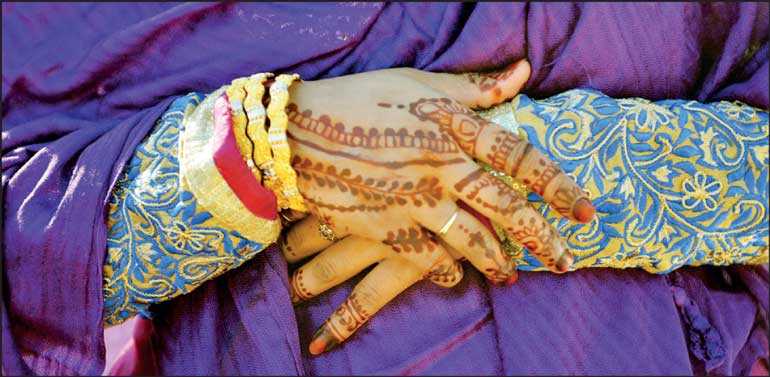Monday Feb 23, 2026
Monday Feb 23, 2026
Saturday, 12 September 2020 00:00 - - {{hitsCtrl.values.hits}}

The Muslim community should of their own volition propose changes to the MMDA to make it compatible with the ‘One Country, One Law’ policy – Pic by Shehan Gunasekara
By Bisthan Batcha
Dear Mr. Sabry,
As you are aware, Muslim marriages in Sri Lanka centre around the Nikah and Walima in accordance with the tenets of Islam.
The Nikah, which is Shariah-based and therefore immutable, is essentially a brief ceremony where, under the guidance of a pious Muslim male, vows are exchanged between the bride’s guardian (Wali) and the groom and is most importantly witnessed (usually) by two pious Muslim males. Additionally, prayers and duas may be recited and a sermon may be delivered by the individual-in-charge if the persons so desire.
That’s it. This is how it was done during the time of our Holy Prophet (sal) and this is how it should done today. There was no ‘certification’ (in written form) of the Nikah done during the time of our Holy Prophet (sal). The ‘certification’ (in verbal form) was provided by the two witnesses.
However, the need for some form of written ‘certification’ of Muslim marriages grew from the fact that other non-Muslim marriages issued certificates in response to evolving socio-cultural-legal requirements of society which necessitated proof of marriage.
Unfortunately in Sri Lanka, this need for a certification was permitted to become an integral part of the Nikah ceremony. A certification that a Nikah ceremony had taken place was therefore regarded as the Muslim Marriage Certificate. The conduct of the ceremony and the issuance of the certificate have merged to become a single entity referred to as the ‘Nikah’.
This, Honourable Minister, has resulted in the sanctification of the Nikah certificate to such an extent that it is now deemed to be as inviolable as the Nikah ceremony itself.
As the first step towards bringing the Marriage Laws governing the Muslim community in line with the policy of ‘One Country, One Law’ enunciated by the President, one must separate the ‘Nikah’ into its two constituent parts – the ceremony and the certification, the former being an obligatory religious act on the part of Muslims and the latter being a secular, administrative requirement.
Mr. Minister, please set the ball rolling by de-sanctifying the certification process. The certification is not Shariah-based. It is merely a written record of the various individuals participating in the Nikah ceremony (names, addresses and signatures) and could therefore be amended to suit new conditions.
The Muslim community should of their own volition propose the following changes to the MMDA to make it compatible with the ‘One Country, One Law’ policy.
1. All Muslim marriages to be registered under the General Marriage Registration Ordinance (GMRO).
This would amount to effecting a change only in the certification process.
2. Additionally, if they so desire, Muslims should be permitted to conduct Nikah ceremonies (within a stipulated period after the certification process under the GMRO) which should be recorded in a Nikah Register to be maintained by the Department of Muslim Cultural and Religious Affairs. Nikah certificates should be issued by the Department upon request. This would ensure that the marriage would be recognised by the Muslim community.
3. Muslim brides and grooms should be permitted to enter into a legally-valid marriage contract which must be signed by both individuals (a kind of pre-nuptial agreement) wherein:
they agree on the quantum of Mahr to be gifted by the groom to the bride
they agree that in the event of death or on the question of inheritance, they will adhere strictly to the relevant Shariah rulings. This will counter any fears that since the original certification was a ‘civil ceremony’, the parties concerned will opt to follow non-Islamic rules in the cases of divorce or death.
they state whatever other specific conditions that both the bride and the groom may mutually agree upon. For example, the groom may agree not to take a second wife without the written consent of the first.
or, in the case of a really progressive couple, where the husband agrees to the termination of the marriage by the unilateral will of the wife (known as Isma) by agreeing to delegate the power of Talaq to his wife (Talaq-al-Tafwid).
This would ensure that the couple are bound by all the relevant Islamic rules.
This would result in a ‘win-win’ situation for the Muslim community as well as for the President’s policy of ‘One Country, One Law’. Most importantly, the Muslim community will be perceived as being willing partners in the efforts of the present Government to foster unity and harmony.
It should be mentioned in this regard that the nearly three million Muslims in the UK continue to lead their pious lives happily under this ‘dual’ registration system of marriages for Muslims. There should therefore be no doubts whatsoever as to the efficacy of this proposed system.